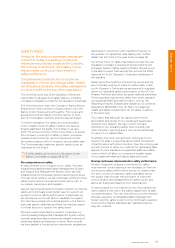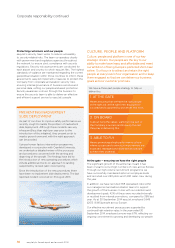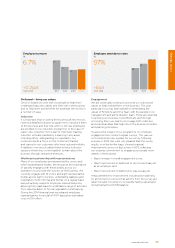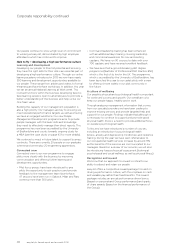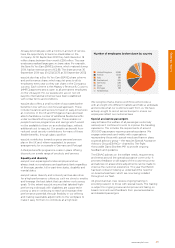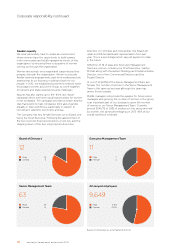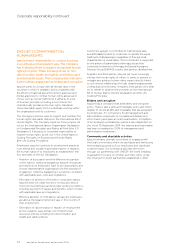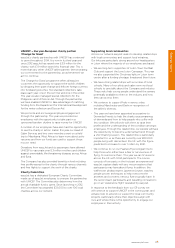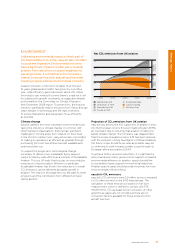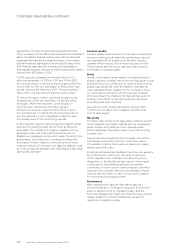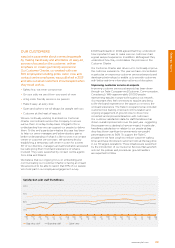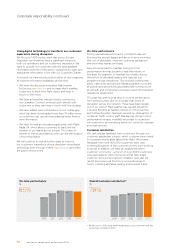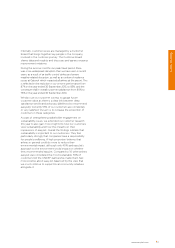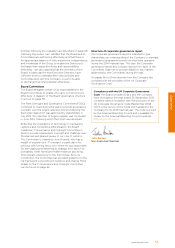EasyJet 2014 Annual Report Download - page 49
Download and view the complete annual report
Please find page 49 of the 2014 EasyJet annual report below. You can navigate through the pages in the report by either clicking on the pages listed below, or by using the keyword search tool below to find specific information within the annual report.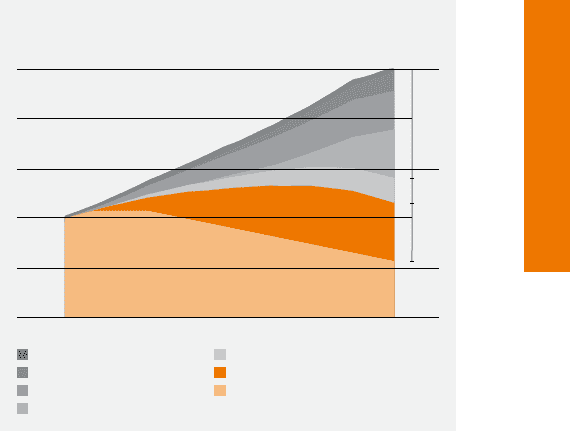
ENVIRONMENT
Addressing environmental impact is clearly part of
the responsibility of an airline. easyJet also considers
it a business imperative. Environmental concerns
have a significant impact on public policy towards
aviation, from restrictions on airport expansion to
passenger taxes. It is therefore in the Company’s
interest to ensure that both easyJet and the wider
industry properly address environmental concerns.
Aviation emissions continue to increase. Over the last
10 years global aviation traffic has grown by over 5% a
year, while efficiency gains have been about 2%. Unless
the industry can reverse this trend there is a real risk it will
be subjected to growth constraints; a suggestion already
put forward by the Committee on Climate Change in
their December 2009 report. To prevent this, the industry
needs to significantly reduce emissions from flying, through
step-changes in technology and the right incentives,
to ensure that airlines and passengers fly as efficiently
as possible.
Climate change
easyJet believes the most important environmental issue
facing the industry is climate change. In common with
other transport organisations, there remain significant
challenges in moving away from reliance on fossil fuels.
In the short to medium term, easyJet remains committed
to making its operations as efficient as possible through
purchasing the most fuel efficient aircraft available and
optimising their use.
To support the longer-term technological change
necessary to deliver more sustainable flying, easyJet
supports industry-wide efforts as a member of Sustainable
Aviation. This is a UK body that focuses on cross-industry
measures to improve carbon efficiency in particular.
Sustainable Aviation has shown how reductions in overall
CO2 emissions can be delivered alongside growth in
aviation. The chart on this page sets out the path to lower
emissions and the contribution from different emission
saving aspects.
Net CO2 emissions from UK aviation
Demand growth
Operations & ATM
Imminent aircraft
Future aircraft
Sustainable fuels
Carbon trading
Net emissions
2040 2050203020202010
1.0
0.5
1.5
2.0
2.5
Fuels
Carbon
trading
Fuel-burn
reduction
Projection of CO2 emissions from UK aviation
easyJet was among the first supporters of aviation’s entry
into the European Union’s Emission Trading System (ETS),
an important step to ensuring that aviation is helping to
tackle climate change. The Company was disappointed
that the scope of aviation’s role in ETS has been reduced
with the exclusion of long-haul flights in 2013 and believes
the future scope should be as wide as possible. easyJet
is continuing to work towards a wider scope through its
European airline association, ELFAA.
To achieve further emission reductions, it is vital that the
policy framework set by governments supports increased
environmental efficiency in aviation. easyJet would like
to see aviation taxes support environmental objectives.
Aviation-specific taxes should provide incentives for more
environmentally efficient flying.
easyJet’s CO2 emissions
easyJet’s CO2 emissions were 5.9 million tonnes compared
to 5.5 million tonnes for the 2013 financial year. The
calculation of these emissions is based on fuel burn
measurement, which is verified to comply with ETS
requirements. CO2 equivalents from emissions of other
greenhouse gases are not included as there are no
conversion factors available for these emissions from
aircraft fuel burn.
www.easyJet.com
47
Strategic report


